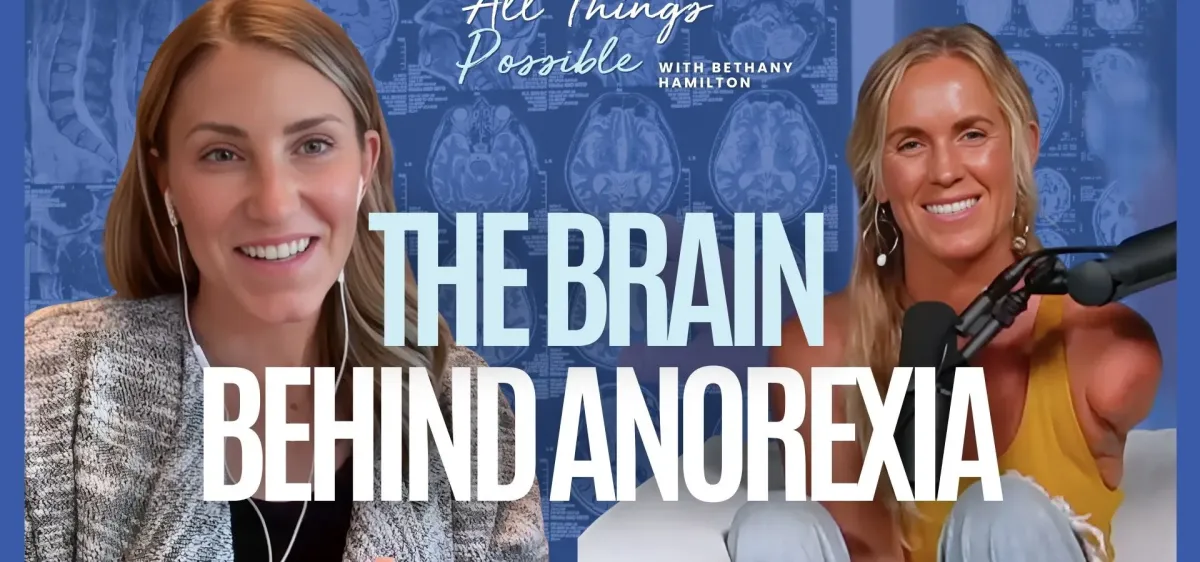THE BRAIN BEHIND ANOREXIA
28.10.2025

Today’s conversation on All Things Possible with clinical psychologist Dr. Deena Muno hit close to home. I’ve met girls over the years who read Soul Surfer from hospital beds while fighting for their lives against eating disorders. Sitting with Deena reminded me: this battle is real, complex, and far more than “just wanting to be thin.” It touches the mind, the body, the family, and the heart.
Deena works on an inpatient unit that medically stabilizes people with eating disorders, primarily restrictive disorders like anorexia and ARFID (avoidant/restrictive food intake disorder). She sees the acute side: slowed hearts conserving energy, electrolyte imbalances, hormones shutting down, bone density loss in teens, and even visible brain changes on MRI when the brain is “starved.” In short: malnutrition impacts every system. That’s sobering. But it’s also a call to action.
What stood out most was the neurobiology piece. Many patients who end up in severe restriction share personality traits that are actually strengths: conscientiousness, kindness, sensitivity, perseverance, and a detail-oriented drive. But when those God-given strengths get locked onto “perfect eating” or weight loss, especially under social media pressure, the cycle can turn deadly fast. Restricting food changes the brain, which then increases rigidity, which then fuels further restriction. It’s a loop that’s hard to break without help.
So what helps? Renourishing the body because a healing brain can participate in healing work and then thoughtfully rewiring patterns through therapy, community, and a new aim for those strengths. I loved Deena’s picture of redistributing strengths: taking the same focus and diligence that once targeted weight loss and aiming them at school, service, creativity, or calling. One of her clients did exactly that and found a hopeful new path serving children—same gifts, different target, life expanded.
As a mom, I asked the parents questions. How do we help our kids? First, resist denial. Ask gentle, direct questions early; early intervention is key. Second, cultivate a home culture that honors bodies as instruments, not ornaments. Our daughters and sons absorb the way we speak about our own bodies. Let our mirror talk be gratitude, not critique. And when loved ones are recovering, skip comments about appearance—even “you look healthy!” can land wrong. Instead, focus on the person: “It’s so good to see you. How are you really?”
We also talked about faith. I believe with all my heart that Jesus meets us in every complicated valley. Yet some valleys require teammates, doctors, therapists, and dietitians, alongside prayer and Scripture. We’re whole people. God often brings healing through both truth and tools. If this is you or someone you love, there’s no shame in needing a team.
A few practices to consider:
Name the lie, feed the truth.Keep God’s Word in view. “Do not be conformed to this world, but be transformed by the renewal of your mind…” (Romans 12:2). The algorithms will preach one gospel about bodies; God offers another.
Practice body gratitude. “I praise you, for I am fearfully and wonderfully made” (Psalm 139:14). Thank God for legs that walk, lungs that laugh, hearts that worship. Bodies are gifts worthy of care, not punishment.
Build real-world connections. Meals around a table, time outdoors, serving together, these reconnect us to creation, community, and joy. Disordered eating isolates; connection interrupts that spiral.
Redirect strengths. Perfectionism can become excellence in craft. Discipline can become faithfulness in service. Sensitivity can become compassion. Ask, “Lord, where do You want these strengths aimed?”
If you’re a friend or family member: check in, listen, and advocate for medical care when needed. Remember, this isn’t about “willpower” or “just stop doing that.” It’s layered—biology, story, family, culture. Be patient, be present, and let your words restore dignity rather than fixate on appearance.
And to the one in the fight: you are not your symptoms. You are not your size. You are not the sum of your worst days. Your body is a temple of the Holy Spirit and you were bought with a price (1 Corinthians 6:19–20). Jesus wants your life—abundant, free, and full (John 10:10). Healing may take time. That’s okay. You can do “hard and holy” things with His help.
If this stirred something, reach out to a trusted friend, a pastor, a counselor, or a doctor. Ask for help early. You’re worth it.
With hope,
Bethany
Major Takeaways
Healing is Whole-Person Work. Eating disorders are not “just about food.” They involve body, brain, story, and soul. Medical stabilization, renourishment, therapy, community, and Scripture all play vital roles.
Redirect, Don’t Erase, Your Strengths. The same conscientiousness and drive that fueled restriction can, by God’s grace, be aimed at purpose, service, creativity, and calling—leading to a bigger, freer life.
More Posts Like This
View Allsubscribe now
Want To Know When New Posts Go Live?
Join my email list for new posts, stories, and Unstoppable life tools.

We’ll email you updates + exclusive early-bird access. No spam, ever.
Search The Blog
Type a word, question, or topic and we'll pull up posts that can help.
Search The Blog
Type a word, question, or topic and we’ll pull up posts that can help.
